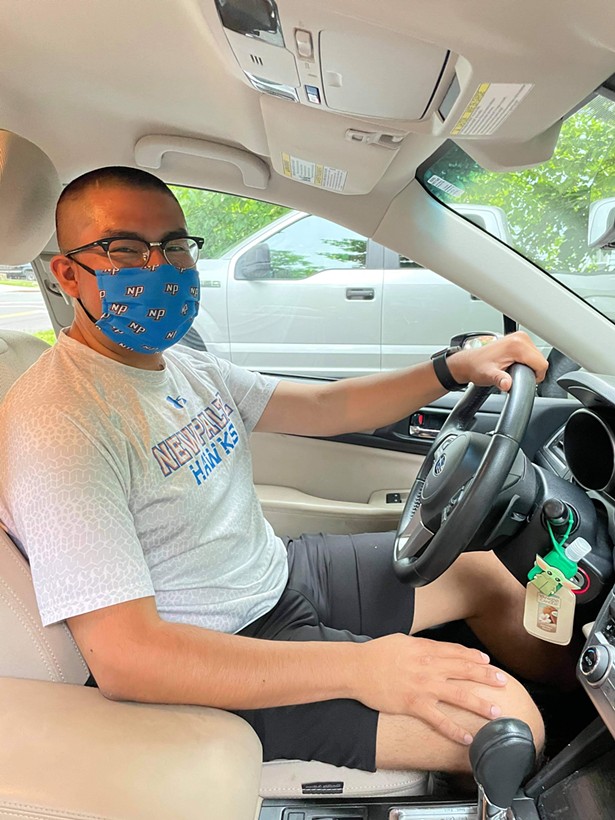Phillip Oshinsky began working for DoorDash during the summer of the pandemic in Tenafly, New Jersey. An immunocompromised person, Oshinsky had just left his job as a waiter because restaurants posed too high a COVID risk. The app-based delivery service allows customers to order food from local restaurants on their phone and either pick it up themselves, or pay to have “dashers” deliver the meals to their door.
After a few months, Oshinksy began to notice that a lot of friends and people in his community had also signed up to be dashers, making deliveries more competitive and forcing him to spend more time working to make the same amount of money. “The first couple of months were amazing,” Oshinsky says. “Then I started to notice that I wasn’t getting deliveries as often as I used to.”
Now a resident of New Paltz, Oshinsky has also dashed in the Hudson Valley, mainly delivering in New Paltz and Poughkeepsie. As a town bustling with small restaurants and college students eager to make money around hectic class schedules, New Paltz has become an epicenter for DoorDash.
“Your time. Your goals. You’re the boss” is the promise DoorDash offers to workers. The app seems appealing because its flexible hours allow people to earn money when they choose. In 2019, about 36 percent of the US workforce was made up of gig workers who work for apps like DoorDash or do other forms of freelance work. The COVID-19 pandemic has created a surge in gig labor as people have lost employment or job security and can’t always rely on an organization to make a living.
Gig work seems promising during an uncertain time. But labor-rights advocates across the nation, including in the Hudson Valley, say working for companies like DoorDash has major pitfalls that could be ameliorated by regulations and policy changes. Since gig workers aren’t legally defined as employees and thus have no employee rights, gig labor has a laissez-faire element: work can be inconsistent and workers don’t receive employee benefits like health insurance, retirement plans, sick days, or job security. There is no set wage or overtime pay. Dashers can make as little as $2 per delivery if the customer doesn’t tip. Plus, car and gas expenses come out of the dasher’s wallet. The lack of benefits and stability convinced Oshinsky that making $16 to $17 an hour dashing is not a sustainable job for people with dependents.
“I don’t really think that anyone that has a family should expect DoorDash to be a lucrative thing other than it just being a side gig,” he says. “I’m only looking after myself. I’m fine with racking up those costs.”
The Debate Around Gig Work
Charles Torres Iglesias has been a dasher for two years, delivering in White Plains. Torres Iglesias started to rely more heavily on the app after losing his job as a substitute teacher when schools closed in March 2020. Though he was rehired as a teacher in May, he still uses DoorDash on the side to make extra money. Torres Iglesias says that his “independent contractor” status with DoorDash gave him problems with his taxes.
“They are employing us and providing us a job, but we are utilizing our own vehicles and paying for our own insurance with no other benefits on the side,” he says. “In the end, we will have to pay a high tax on our earnings.”

Most workers on gig-based apps are classified as independent contractors and can’t unionize. But labor-rights advocates say that the Protecting the Right to Organize Act of 2021 (PRO Act) is a step in the right direction. The PRO Act, passed by the House of Representatives on March 9, would revise the definitions of an employee, supervisor, and employer to broaden the scope of workers under the fair labor standard; would allow labor organizations to support the participation of union members in strikes organized by employees represented by a different labor organization, or secondary strikes; and would ban employers from bringing claims against unions for participating in secondary strikes.
What this means for gig workers is that they would be granted the right to organize. To become a law, the bill still needs to pass the Senate and be approved by President Joe Biden.
Sandra Oxford of the Hudson Valley Area Labor Federation—an organization that represents 113,000 unions across Columbia, Dutchess, Greene, Orange, Rockland, Sullivan, and Ulster counties—says the PRO Act is important for gig workers because union contracts would ensure workers have certain rights and benefits. That could provide relief if a gig worker, say, has an accident while making deliveries or gets hurt on the job. Oxford says that companies like DoorDash can get away with not giving their workers rights because they’ll never run out of people looking for some extra cash—often using the promise of flexible hours to appeal to busy college students.
“[Companies are] just churning through these workers,” Oxford says. “There is nonstop availability in college kids. I always call it the needy talking to the greedy.”
Workers’ rights and the reclassification of gig laborers have been debated in recent years outside this country. DoorDash currently operates in Canada and Australia in addition to the US; all three countries define gig workers as independent contractors rather than employees.
But on February 23, the Canadian Union of Postal Workers (CUPW) announced the launch of the Gig Workers United campaign to organize gig workers for “better conditions and rights.” The campaign came a year after the Ontario Labour Relations Board decided to allow Foodora couriers to unionize. Foodora, a delivery service used outside the US, then ceased operations in Canada, resulting in complaints filed by the CUPW saying that the company shut down because the Canadian Foodora workers could now organize. The CUPW’s complaints got former Foodora couriers across Canada a $3.46 million settlement in 2020.
In the US, the fight for workers’ rights, livable wages, and safety precautions has made more halting progress. In September 2019, a major component of California’s Assembly Bill 5, the “ABC” test, was passed. The test broadens the qualifications and considers all workers employees rather than independent contractors unless the worker is free from control of the company in regards to work performance, the worker performs work outside of the company’s business, and the worker is engaged in established trade, job, or business in the same nature as the company. Under the ABC test, Oshinsky, who works four hours a day making 16 to 20 deliveries, would be considered a DoorDash employee.
But in November 2020, 59 percent of California voters passed Proposition 22, a law backed by gig-companies to undermine the AB5 law. Prop 22 allows these companies to continue to classify their workers as independent contractors.
“Californians sided with drivers, recognizing the importance of flexible work and the critical need to extend new benefits and protections to drivers like Dashers,” said DoorDash CEO Tony Xu in a statement to FOX Business after the passage of Prop 22.
Contractor or Employee?
One of the main arguments against redefining gig work is that it would impact the flexible nature of the job.
Oxford says that a flexible schedule shouldn’t be a trade-off for workers’ rights. Without unions, Oxford says gig workers are vulnerable to exploitation like tip theft and unjust firing practices that flexible hours don’t make up for.
“The fact that we’re talking about technology and flexible hours, that should not justify any lower standard for workers,” Oxford says. “That’s no excuse. In this modernized world, we should be able to figure out a way that the flexibility of scheduling doesn’t mean that you have to lower the standard.”
The New York chapter of the American Federation of Labor and Congress of Industrial Organizations (AFL-CIO) has been pushing for more recognition for people like Oshinsky to earn equal worker rights since 2018. It supports the PRO Act. “It is the most significant worker empowerment legislation since the Great Depression,” says New York State AFL-CIO President Mario Cilento.
Oshinsky says that at times, working for DoorDash feels like a game instead of a job, one that workers need to learn how to play to benefit from the labor. For example, he says, dashers need to learn to not accept $3 deliveries, prioritize deliveries from restaurants that make food quickly, and accept orders from wealthier areas.
How much money dashers earn per delivery is more dependent on where they work rather than the work they do. Oshinsky has been a dasher in New Paltz, Poughkeepsie, and Tenafly. When he delivered in New Paltz and Poughkeepsie, he made about $15 an hour. In New Jersey, he clears $20 easily.
The discrepancy is in the tip. Oshinsky says he makes less in the Hudson Valley because New Paltz is full of college students who want to eat on a budget and residents in Poughkeepsie, which has higher rates of poverty, are less likely to tip. In New Jersey, meanwhile, he delivers to upper-middle-class families who can afford to tip well.
The COVID-19 Gig Economy
Although the conversation surrounding gig workers has been ongoing for years, the pandemic has laid bare the tenuous nature of gig labor.
“The pandemic has certainly exacerbated all of these issues and so much has fallen on the shoulders of the gig workers,” Oxford says. “These are the people who showed up every day and many of these companies are doing very well. Quite a few have flourished in this pandemic as a result of the sweat, tears, and labor of these gig workers.”
While many forms of gig labor suffered last year—most notably Uber and Lyft drivers and in-home services on apps like TaskRabbit—food delivery boomed as restaurants increasingly relied on it to make ends meet. Marketwatch reports that four of the leading delivery apps—DoorDash, Grubhub, Uber Eats, and Postmates—raked in more than $5.5 billion from April through September last year, more than double the previous year’s haul. DoorDash alone reported 543 million total orders for the first nine months of the year, a threefold increase over the same period in 2019.
Oshinsky has temporarily stopped using DoorDash because it was “mentally exhausting” working without coworkers, but Torres Iglesias continues to use the app. Oshinsky is hesitant about policy changes around gig work because he feels like the company will be able to get around new provisions for worker rights. Torres Iglesias, on the other hand, hopes that changes could be made to make the job more accommodating for dashers.
“If the company wants to continue keeping us in their system,” he says, “they should provide us with extra incentives to continue the work and guarantee us insurance and job security to make us feel safe and welcome to continue working.”


















